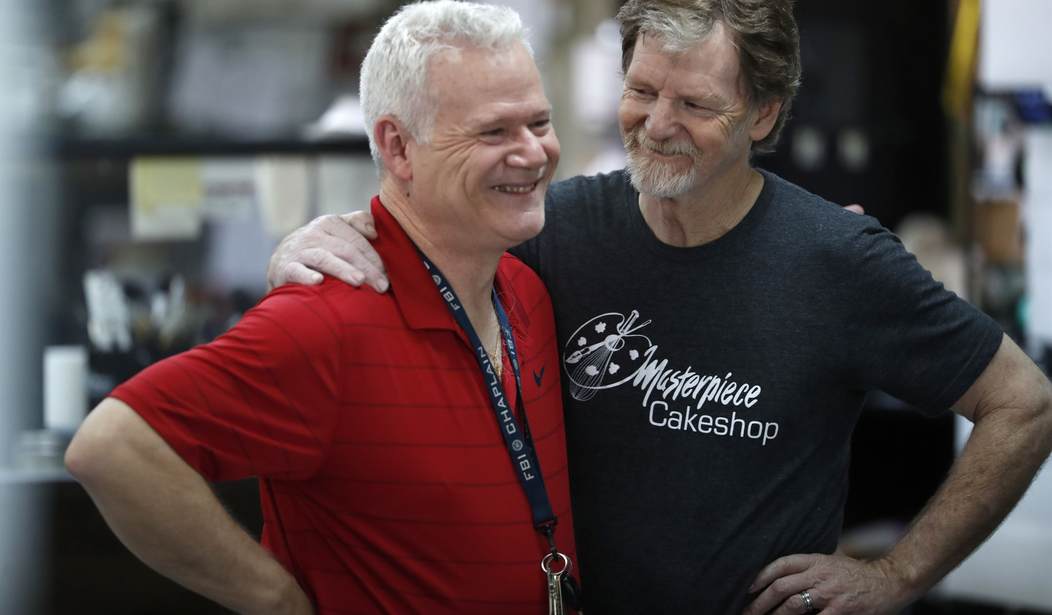There is right and there is wrong. Not to mention the importance of getting along.
These principles collided last week when the U.S. Supreme Court ruled in favor of a Colorado baker who would not create a wedding cake for a gay couple. Lopsided at 7-2, the ruling was nevertheless narrow, predicated largely on the hostility the Colorado Civil Rights Commission had shown toward Christians in general and Jack Phillips, the Christian owner of Masterpiece Cakeshop, in particular.
“The outcome of cases like this in other circumstances must await further elaboration in the courts,” wrote Justice Anthony Kennedy for the majority of the High Court. “These disputes must be resolved with tolerance, without undue disrespect to sincere religious beliefs, and without subjecting gay persons to indignities when they seek goods and services in an open market.”
“Maybe most notably,” Justice Neal Gorsuch stated, concurring with Kennedy’s opinion, “the Commission allowed three other bakers to refuse a customer’s request that would have required them to violate their secular commitments. Yet it denied the same accommodation to Mr. Phillips when he refused a customer’s request that would have required him to violate his religious beliefs.”
One day after the ruling, South Dakota State Rep. Michael Clark posted on his Facebook page a statement endorsing the idea that a business owner “should have the opportunity to run his business the way he wants. If he wants to turn away people of color, then that’s his choice.”
Rep. Clark elaborated, as the Argus Leader paraphrased, that “if the community doesn’t support a store or restaurant that bars customers for that reason or others, it will put them out of business.”
Clark soon backpedaled, saying that he was against discrimination.
It is instructive to note that Sen. Barry Goldwater (R-Ariz.) had opposed the 1964 Civil Rights Act on the exact same grounds. He believed a businessperson had a right, whether right or wrong, to choose one’s customers. Goldwater made clear at the time that discrimination on race was abhorrent, as well as economically foolish.
Recommended
Interestingly, Goldwater was perhaps the only GOP Senator to support gays openly serving in the military. “You don’t need to be ‘straight’ to fight and die for your country” the plain-spoken senator quipped, “You just need to shoot straight.”
Libertarians — who have supported equal rights for gays, including same-sex marriage, at least since the Libertarian Party was formed nearly a half-century ago — also cringe at the thought of giving government the power to override the freedom of businesses to associate or not. That pesky First Amendment and all.
Theoretically, that remains the libertarian or classical liberal position. But when I think back to 1964, and the state of race relations, and the violence threatened against those who sought to freely integrate the races, I have no desire to claw back that “freedom.”
My family moved to Arkansas from New Jersey in 1968 and I remember being very afraid for black ministers on TV leading marches for equal rights. Don’t forget, not only did the terrorism of the KKK circumscribe one’s liberty back then, but the racism was often actively state-supported — via Jim Crow laws, laws against interracial marriage, and in states like Mississippi, with state agencies dedicated to racial segregation and police state tactics.
Businessmen were generally for making money on black customers. Just not at the price of having their home or business fire-bombed. The block to integrated lunch counters and more was the terror created by racist vigilantes protected, assisted and even directed by the State.
Something had to give. Hence the federal legislation in ’64.
In theory, a business owner has every right to refuse service to anyone for any reason. You know, freedom. But in reality, who wants to return to a day when folks had to worry about the indignity of being kicked out of a store or denied service because of their race?
Or religion. Or sexual orientation.
Even Petula Dvorak, the ultra-liberal Washington Post columnist, stopped freaking out long enough to discover displays at Walmart and Target featuring gay pride merchandise and proclaim: “Market forces, not a narrow court ruling, are winning the day.”
All sides, of course, know that there will be more court rulings.
A Washington state case already seeks a day before the High Court. Barronelle Stutzman, the owner of Arlene’s Flowers, is appealing her state supreme court's verdict that she violated the state’s anti-discrimination law by refusing to provide flowers for a gay wedding.
“I serve everyone. What I can’t do,” she argues in her defense, “is create custom floral arrangements that celebrate events or express messages at odds with my faith. For that, the attorney general has relentlessly prosecuted me, even suing me in my personal capacity.”
There is indeed something to the difference Stutzman cites.
Discrimination in public accommodations foster a society where folks might be — as black Americans were — afraid to travel for fear of being stranded. That is against the law now. And the idea of telling people they cannot shop at a store because of their race or religion or sexual orientation or anything not an immediate danger to others is now anathema.
But, today, we can have our cake baked and let bakers be free, too. There are many bakeries and floral shops of diverse political and religious attitudes across the land.
So, let us draw a legal line that permits the baker to say, “No, I don’t feel comfortable making you that cake”; the florist to enjoy the freedom to decline your request to design that floral arrangement; the performer within his or her rights to not perform at your wedding.
The principle would go beyond cakes and flowers and piano players. It would mean a legal recognition that purchasing the creative talents of businesses or their attendance at your event is only possible with their consent.
It would maximize freedom without disrespecting either the customer or the business.

























Join the conversation as a VIP Member